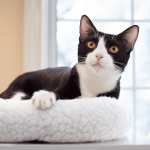There’s no arguing that cats can make the best pets for many people. The trouble is, they can also cause a lot of red, watery eyes and stuffy noses for people with allergies. If you’re ready to bring a friendly feline into your life but worry about the possible allergies you may battle, we’ve got some great tips for choosing your new cat wisely. Let’s dive into the fascinating world of hypoallergenic cats and discover which breeds could be the purrfect match for you!
What is a Hypoallergenic Cat?
According to research, if you suffer from cat allergies, there is some good news for you! While there is no such thing as a completely hypoallergenic cat, there are certain breeds that produce lower levels of allergens and are more suitable for people with allergies. These breeds are commonly known as hypoallergenic cat breeds.
If you’ve been dreaming of having a feline companion but have been worried about allergies, fear not! Hypoallergenic cat breeds such as the Siberian, Siamese, Bengal, Russian Blue, Sphynx, Devon Rex, Cornish Rex, Javanese, Balinese, Oriental Shorthair, and Burmese can be a great choice for you. These cats have different coat types and produce fewer allergen-causing proteins, making them a better fit for individuals with allergies.
It’s important to note that each individual may react differently to different breeds, so it’s recommended to spend some time with the breed you’re interested in before bringing them home. This will help you determine how your allergies react to them. But don’t worry, with the variety of hypoallergenic cat breeds available, there’s a good chance you’ll find a furry friend that won’t set off your allergies.

What Causes Cat Allergies?
Cat allergies are a common issue for many people. Contrary to popular belief, the fur itself is not the primary cause of these allergies. Instead, it is the allergens that cats produce. The main culprit behind cat allergies is a protein called Fel d 1, which can be found in various sources within a cat’s body.
When cats groom themselves, their saliva, which contains Fel d 1, gets deposited on their fur. This allergen can then easily transfer to bedding, furniture, and clothing, causing allergic reactions in sensitive individuals. Moreover, cat urine, dander, and skin oils also contain traces of this protein, further contributing to your allergy triggers.
Dander, consisting of tiny pieces of dead skin that cats naturally shed, is another significant source of cat allergens. These allergens can become airborne and settle on various surfaces, including carpets, upholstery, and clothing. Consequently, when one comes in contact with these surfaces, they may experience allergic symptoms.
It’s important to note that while all cats produce Fel d 1 and dander, some breeds are known to produce lower levels of these allergens. This makes them less likely to trigger allergies in sensitive individuals.
Top Hypoallergenic Cat Breeds
If you’re an allergy sufferer but still want the joy of having a cat, there’s good news for you. There are several cat breeds that are considered hypoallergenic or low-allergen, making them a better fit for individuals with allergies. These breeds produce lower levels of allergens, which can help reduce allergic reactions.
Here are some of the top hypoallergenic cat breeds:
- Siberian: The Siberian breed has been found to produce lower levels of the Fel d 1 protein, which is the main allergen in cats. They also shed less, reducing the amount of allergens in the environment.
- Siamese: Siamese cats have a short coat that doesn’t shed heavily, making them a good choice for allergy sufferers.
- Bengal: Bengal cats have a unique coat pattern that produces fewer allergens. They are also known for their playful and energetic nature.
- Russian Blue: Russian Blue cats have a short, dense coat that produces lower levels of allergens. They are known for their striking blue-gray coat color.
- Sphynx: Sphynx cats are hairless, which means they don’t produce as much dander as other breeds. However, they still produce some allergens in their saliva and skin oils.
- Devon Rex: Devon Rex cats have a soft, curly coat that sheds less and produces fewer allergens.
- Cornish Rex: Similar to the Devon Rex, Cornish Rex cats have a curly coat that can help reduce allergies.
- Javanese: Javanese cats have a long, silky coat that doesn’t shed as much as other breeds, making them a good choice for allergy sufferers.
- Balinese: Balinese cats have a long, silky coat that produces fewer allergens. They are often referred to as the “long-haired Siamese.”
- Oriental Shorthair: Oriental Shorthair cats have a short coat that sheds less and produces fewer allergens. They come in a variety of colors and patterns.
- Burmese: Burmese cats have a short coat that doesn’t shed heavily, making them a good option for people with allergies.
Each of these hypoallergenic cat breeds has its unique characteristics and grooming needs, so it’s important to do thorough research and spend time with them before making a decision. Remember, while these breeds may be more suitable for people with allergies, individual reactions can vary. Spending time with the breed and consulting with an allergy specialist is recommended before bringing a cat into your home.
So, if you’ve been longing for a furry companion but have been held back by your allergies, consider one of these hypoallergenic cat breeds. You can finally experience the joy of having a cat without all the sneezing and itching.
By choosing a hypoallergenic cat breed and implementing proper hygiene practices, you can enjoy the companionship of a cat while minimizing the impact of cat allergies. Remember, it is essential to prioritize your well-being and find the best cat breed that suits your individual needs.






